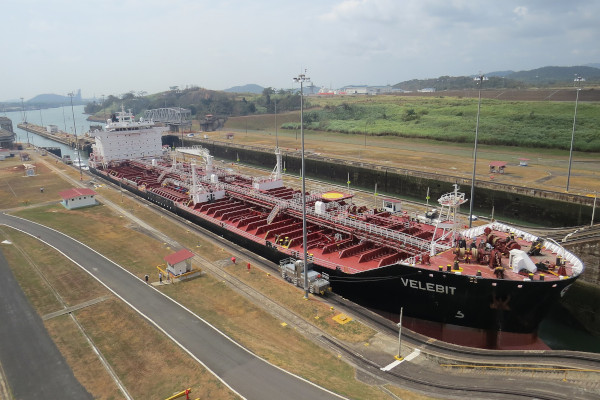The ongoing drought conditions at the Panama Canal continue to significantly hamper operational throughput on various fronts.
At the end of October, data issued by the Panama Canal Authority (ACP) put the current situation into perspective, while also rolling out new operational measures with roughly 50 days (at that time) left in the “rainy season.”
“The month of October is the driest since the earliest registers, 73 years ago,” said ACP. “The drought caused by the El Niño phenomenon continues to impact the Panama Canal’s reservoir system and, as a result, water availability has been reduced.”
What’s more, ACP explained that in 2023, there has been 41% less rain than usual, which it said has lowered Gatun Lake to what it called unprecedented levels for this time of year. And it noted that this presents significant challenges, for the Canals, with less than two months remaining until the completion of rainy season.
“The Canal and the country face the challenge of the upcoming dry season with a minimum water reserve that must guarantee supply for more than 50% of the population and, at the same time, maintain the operations of the interoceanic waterway,” said ACP.
Taking steps to address these challenges, ACP has rolled out reservation slots, with the objective of maintaining a competitive draft from November to February, including Nov. 8-30, 24 reservation slots; Dec. 1-31, 20 reservation slots; Jan. 1-31, 20 reservation slots; and as of Feb. 1, 2024, 18 reservation slots.
ACP said these measures are being implemented in order to preserve fresh water resources and also to ensure the safety of transit operations like using water reutilization basins in the Neopanamax locks and also cross-filling in the Panamax locks.
The reduction in the number of available reservation slots is likely to hinder East Coast U.S. trade levels, as traveling through the Panama Canal, from Shenzen, China, takes 35 days, whereas the Suez Canal is 41 days, according to a CNBC report. And the report also pointed out that 40% of all U.S. container traffic travels through the Panama Canal every year, which moves around $270 billion in cargo per year.
Read More: Ongoing Panama Canal drought continues to impact throughput and transit times
SC
MR


Latest Supply Chain News
Latest Podcast

 Explore
Explore
Business Management News
- AdventHealth named top healthcare supply chain by Gartner
- Unlocking retention: The role employee engagement plays
- Can supply chain managers embrace an entrepreneurial mindset?
- Challenges to ESG reporting
- With capacity to spare, logistics real estate demand remains subdued
- How to improve demand forecasts for new product families
- More Business Management
Latest Business Management Resources

Subscribe

Supply Chain Management Review delivers the best industry content.

Editors’ Picks




